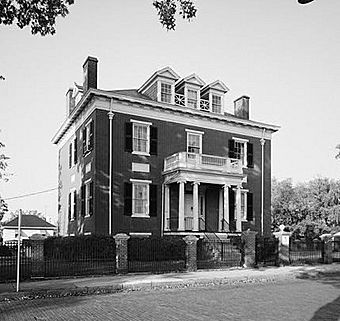Carter Glass House facts for kids
|
Carter Glass House
|
|
|
U.S. Historic district
Contributing property |
|

1976 HABS photograph
|
|
| Location | 605 Clay St., Lynchburg, Virginia |
|---|---|
| Area | 1.5 acres (0.61 ha) |
| Built | 1827, 1907 |
| Architect | Wills, John |
| Part of | Court House Hill-Downtown Historic District (ID01000853) |
| NRHP reference No. | 76002183 |
Quick facts for kids Significant dates |
|
| Added to NRHP | December 8, 1976 |
| Designated NHL | December 8, 1976 |
| Designated CP | August 16, 2001 |
The Carter Glass House is a special historic home located at 605 Clay Street in Lynchburg, Virginia. It was built way back in 1827. This house is important because it was the home of Carter Glass (1858-1946) for many years. He was a very important person in the United States government.
Carter Glass was a Congressman, a Senator, and even the Treasury Secretary. He helped create the Federal Reserve System, which is like the central bank of the U.S. He also helped pass the Glass-Steagall Act, a law that changed how banks work. Because of his importance, the house was named a National Historic Landmark in 1976. Today, it is used as a hall for the nearby St. Paul's Church.
Contents
What Does the Carter Glass House Look Like?
The Carter Glass House is in a historic part of Lynchburg called Court House Hill. It's on the west side of Clay Street. The house is next to St. Paul's Church, with a big lawn separating them.
Architecture and Design of the House
The house is a large, almost square building made of red brick. It has 2 1/2 stories and sits on a raised basement. The roof is shallow and covered with slate tiles.
The front of the house has a special porch called an Ionic order portico. This porch has a wooden floor and is supported by four tall columns and two flat columns called pilasters. It gives the house a grand and classic look.
Who Lived in the Carter Glass House?
The house was built in 1827 by John Mill, who was a local lawyer and architect. In 1853, his daughter and son-in-law, George Dixon Davis, took ownership of the house.
Carter Glass's Time in the House
In 1907, Carter Glass bought the house. It became his main home until 1923, and he owned it until he passed away in 1946. Carter Glass made some updates to the house, like adding modern systems and dormer windows to the roof. Since he owned it, the house hasn't changed much. In 1960, St. Paul's Church bought the house.
Why Was Carter Glass Important?
Carter Glass was a very important person in shaping how the United States manages its money. He helped create some of the most important financial systems we have today.
Creating the Federal Reserve System
When he was a Congressman, Carter Glass led the House Committee on Banking and Currency. He worked with others to create the Glass-Owen Bill. This bill became a law in 1913 and established the Federal Reserve System. The Federal Reserve helps keep the U.S. economy stable. It manages the country's money supply and oversees banks.
The Glass-Steagall Act
In 1920, Carter Glass was elected to the Senate. There, he sponsored another important law called the Glass-Steagall Act in 1933. This law made sure that investment banking and commercial banking were kept separate. This was done to protect people's money and prevent financial problems.
His Role During the New Deal
During the 1930s, Carter Glass was a strong voice in politics. He often disagreed with President Franklin Delano Roosevelt's New Deal programs. These programs were designed to help the country recover from the Great Depression. Glass had different ideas about how to fix the economy.



